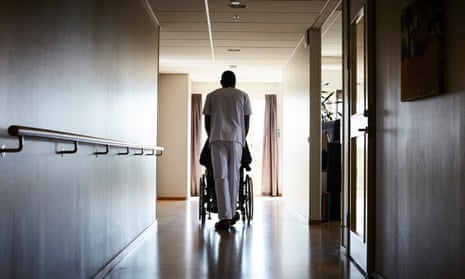Hospice charities providing end-of-life services in partnership with the NHS have warned they will have to shut beds and sack staff because of the catastrophic impact of rising energy bills on their day-to-day running costs.
The UK’s network of independent, mainly voluntary-run palliative care providers said hospices were experiencing a perfect storm of soaring costs and rising demand just as revenues from traditional public fundraising methods are collapsing.
They have also warned that many patients who receive palliative care at home are struggling to maintain optimal care standards because they can’t afford to run central heating and the electrical medical equipment used in their everyday clinical care.
Hospices, which typically rely on charitable donations for 7o%-80% of their running costs, and which are intensive users of gas and electricity, have reported facing energy bill rises of up to 350%.
There are more than 200 hospices across the UK, caring for more than 300,000 adults and children every year who need end-of-life care and treatment for life-shortening conditions. Many hospices are reporting increased demand for services from people whose conditions went undiagnosed during Covid.
Hospice UK’s chief executive, Toby Porter, urged the government to offer guarantees to hospices that they would continue to receive state help with energy bills after the current business support scheme ends on 31 March.
“The cost of living crisis is having a huge impact on hospices and the people they care for. Hospices are a critical partner to the health system … If rising energy costs impact their ability to continue those services, then this will have a knock-on effect on to the already overstretched NHS,” he said.
Individual hospices have told the Guardian they are dipping into financial reserves set aside for capital projects or service development and using them to pay energy bills. However, this is not sustainable in the long term, and many are now looking at potential cuts.
Rachel McMillan, the chief executive of one of the UK’s biggest hospices, St Ann’s, in Greater Manchester, said: “We are at the point where we will have to take some very difficult decisions in terms of our business model and our service provision. Closing beds would be a last resort, but we are seriously going to have to think about this.
“The government needs to sit up and listen to hospices; we are an essential part of the care delivery system. We are not a luxury.”
Tŷ Hafan children’s hospice in south Wales said it had received a quote of £600,000 a year for its energy needs across its main site and network of 18 charity shops. Its total energy bill last year was £100,000. Even with help from the government’s current support scheme, it expects its bill to be £332,000.
North Devon Hospice, which cares for about 2,500 patients, said it was budgeting for a £1m loss this year on its turnover of £6m. Energy costs alone had risen from £75,000 a year to £377,000. “The hospice sector is an unseen victim of the cost of living crisis,” a spokesperson said.
Hospice care – whether provided as inpatient care or at home – is an intensive user of energy because of the need to maintain temperatures as well as extensive electrical equipment, from oxygen pumps and ventilators to hoists.
Most hospices are dependent on local fundraising, through charity shops, lotteries and bucket collections, to stay afloat. But some said many donors could no longer afford to give and were unsubscribing from £1-a-week local fundraising lotteries.
Nearly one in five charities are warning that they will have to cut services and staff in the next few months because of rising energy costs, according to a survey by the charity thinktank Pro Bono Economics.
“Without an extension of support from the government … organisations will be forced to restrict their services at a time when more people will be reliant on them than ever,” said Sam Mercadante at the National Council for Voluntary Organisations.
A government spokesperson said: “Our sympathies are with anyone who is in hospice care and their families. We understand the pressures hospices face with rising energy bills and we have continually taken action to help with costs.
“This is why we are delivering the energy bill relief scheme, which means public and voluntary sector organisations, including hospices, may pay less than half the predicted wholesale cost of energy this winter.”
